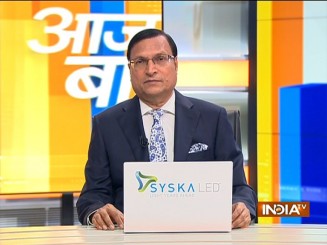 Tearful tributes were paid to India’s first Chief of Defence Staff Gen Bipin Rawat, his wife Madhulika and other armed forces personnel who perished in the helicopter crash near Coonoor, Tamil Nadu.
Tearful tributes were paid to India’s first Chief of Defence Staff Gen Bipin Rawat, his wife Madhulika and other armed forces personnel who perished in the helicopter crash near Coonoor, Tamil Nadu.
Candlelight vigil was held in many cities by Indian citizens, while a big crowd turned up on the roads of Delhi as the gun carriage carrying the General’s mortal remains went from his residence to Brar Square crematorium in Delhi Cantonment. Youths carrying the tricolour ran with the cortege chanting ‘Bharat Mata Ki Jai’ and ‘Vande Mataram’. A 17-gun salute was given to the General in the presence of Raksha Mantri Rajnath Singh, chiefs of the three armed forces and dignitaries from UK, Russia, France, Nepal, Sri Lanka, Bangladesh and Bhutan.
There were emotional scenes as the two daughters of Gen. Rawat, Kritika and Tarini, performed the last rites by lighting the funeral pyres of their parents. The last rites of Brig Lakhvinder Singh Lidder, defence adviser to the CDS, were also performed at the crematorium earlier in the day. The funeral of Gen Rawat took place with full military honours, with ‘The Last Post’ played by tri-service buglers. The world has seen the valour of our jawans and officers, but on Friday, the world saw how two brave daughters overcame their grief to light the funeral pyres.
Brig Lidder’s 17-year-old daughter Aashna said, “My father was my best friend, my mentor. He pampered me a lot and he could never bear to see tears in my eyes. I therefore decided not to weep while giving him the final farewell.”
It’s great to be a soldier, but to be a soldier’s son, daughter, wife or parents is not easy.
While watching the funeral, I was reminded of Gen. Rawat’s words, “a soldier performs his duty not for money or job, he does that so that he can offer his supreme sacrifice for the nation”. Gen. Rawat and other armed forces personnel performed their duty till their last breath when Death snatched them away from us.
The heart of every Indian was filled with pride and grief, when the daughters of the General and Brigadier performed the final rites, with patience and dignity. Chants of “General Rawat Amar Rahe” , “Bharat Mata Ki Jai” were heard when 17 guns boomed to salute the General. In life, he had won battles against enemies, and in death, he won the heart of every Indian.
How did Gen. Rawat become so popular among the people? One needs to understand the reasons/ The General understood the feelings of the people, and was always in favour of giving befitting reply to our enemies, both in words and deeds. When he said, ‘terrorists will continue to come from Pakistan, and our armed forces will bury them two and a half feet deep’, his words resonated in the minds of people. When he said, ‘China is our main enemy and we have the capability to tackle them’, it kindled the flame of courage in the minds of every Indian.
The General was soft with people who were his junior, but he was equally stern against the nation’s enemies. People loved to hear him speak. The General never spoke on politics. He expressed his thoughts only on defence, strategy, army, command and valour. He always spoke about giving befitting reply to the enemy. People loved him for his clear thinking.
The General tried his best to bring about coordination between the three Services by beginning the process of creating theatre commands, as the US and China have done. This is now an unfinished task because of his untimely death. The General was involved in the process of modernizing the three Services with the latest weapons, technology and fire power. The people of India trusted him, and this was evident from the outpouring of grief among the common people, when they lined up the roads to shower flowers on his cortege. For the first time in history, people paid their respects to a serving Defence Chief during his last journey, in such a manner.
Gen. Bipin Rawat has become immortal. He shall continue to have his place in the hearts of people. He will be remembered forever and his stories of courage and valour will be passed on to future generations in the homes of every Indian.